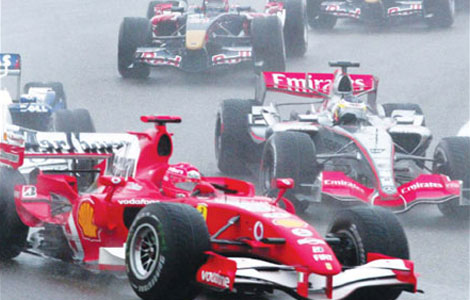Economy
BRICS nations seek shared prosperity
Updated: 2011-04-14 22:21
(Xinhua)
SANYA - A decade after Goldman Sachs economist Jim O'Neil coined the term BRIC, it has gone beyond an economic theory and evolved into a platform for pragmatic cooperation.
O'Neil created the acronym to draw attention to four fast-growing emerging economies- Brazil, Russia, India and China. Now, the bloc, expanded with new member South Africa, is using the idea to forge tighter links and get their voices heard.
|
||||
The one-day BRICS summit, under the theme of "Broad Vision, Shared Prosperity", was chaired by Chinese President Hu Jintao and attended by Brazilian President Dilma Rousseff, Russian President Dmitry Medvedev, Indian Prime Minister Manmohan Singh and South African President Jacob Zuma.
China's Assistant Foreign Minister Wu Hailong told reporters after the summit that the meeting has helped coalesce views of the BRICS leaders on major issues and bring closer the relations of BRICS countries.
The Sanya Declaration, issued after the summit, outlined the countries' future cooperation and their decision to deepen exchanges and cooperation in fields such as finance, industry and commerce, science, technology and energy, Wu said.
Global economic governance
The five countries vowed to support the reform and improvement in international monetary system for the establishment of a stable, reliable and broad-based international reserve currency system, according to the Sanya Declaration.
The countries welcome the current discussion about the role of the SDR (special drawing rights) in the existing international monetary system including the composition of SDR's basket of currencies, says the declaration.
As a step forward, banks from the five nations agreed Thursday to bolster cooperation on greater use of their local currencies, instead of the greenback, for settlement.
The BRICS leaders believed the management structure of the international financial institutions should reflect changes in the world economy and increase the voice and representation of emerging economies as well as developing nations, the declaration says.
The BRICS nations have witnessed robust growth in trade over the past decade. From 2001 to 2010, trade among the five countries grew at an annual rate of 28 percent to reach nearly $230 billion.
The five economies outshined during the global financial crisis. Their combined gross domestic product (GDP) accounted for 18 percent of the global GDP in 2010. Their trade volume took up 15 percent of the world's total last year.
But experts warned that the BRICS countries still faced overheating problems such as inflation pressures and asset bubbles.
The BRICS nations called in the joint declaration for more attention to the risks posed by massive cross-border capital flows to the emerging market and urged major economies to coordinate macroeconomic policies in order to push for a robust, sustainable and balanced growth in the world economy.
Regional turbulence
On the situation in the Middle East and north and west Africa, the declaration says that force should be avoided in resolving regional turbulence.
"We should seek peaceful settlement of international disputes through dialogue and consultation," President Hu said at the summit.
The BRICS leaders expressed their concerns about the turbulence in the Middle East, the north African and west African regions, saying they sincerely wish that the countries affected achieve peace, stability, prosperity and progress and enjoy their due standing and dignity in the world according to legitimate aspirations of their peoples.
The five countries vowed continuous cooperation in the UN Security Council on the issue of Libya and urged parties concerned to resolve their differences through peaceful means and dialogue.
They said that the UN and regional organizations should play their role. They also voiced support for the African Union High-Level Panel Initiative on Libya issues.
E-paper

Green light
F1 sponsors expect lucrative returns from Shanghai pit stop
Preview of the coming issue
Toy for rich boys
Reaching out
Specials

Share your China stories!
Foreign readers are invited to share your China stories.

No more Mr. Bad Guy
Italian actor plans to smash ‘foreign devil’ myth and become the first white kungfu star made in China.

Art auctions
China accounted for 33% of global fine art sales.



